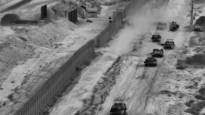Israel will very likely launch a ground attack on Gaza in the near future. Its goal is to destroy the military power of the terrorist organization Hamas, so that it would no longer be able to threaten Israel.
Israel’s ground attack expands the conflict and causes Israel’s opponents to step up their own countermeasures, says a lieutenant colonel working at the Defense Research Institute Juha Mäkelä.
Hamas is especially supported by Iran, which also cooperates with Yemen’s Houthi rebels, Lebanon’s Hezbollah organization and Shia Muslim groups operating in Iraq.
Mäkelä is certain that when Israeli forces begin to penetrate Gaza, these groups will intensify their own attacks against Israel as well as US forces and bases in the Middle East.
Throughout the current conflict, Hezbollah has been firing rockets and grenades into northern Israel. American forces in Iraq and Syria have been attacked 19 times by Iran-backed forces in the last week alone, reports news agency Reuters. 21 US soldiers have been wounded in the attacks.
– In the Middle East, some groups draw parallels between Israel and the United States, says Mäkelä.
Strikes against Israel, but not too many
The supporters of Hamas cannot send weapons to Hamas and they cannot participate in military operations directly on the Gaza front. However, they carry out attacks to show their own supporters that they are in spirit fighting against Israel.
Pro-Iranian groups operating in Iraq mostly use rockets, which can also be home-made. Their destructive power is not significant.
– These are mostly “shoot, run and hide” type attacks, Mäkelä states.
The US has tried to prevent the attacks by carrying out airstrikes on the bases of Iran-backed groups in Iraq and Syria.
According to Mäkelä, the factions must be careful not to irritate Israel too much. They must be able to calculate what amount of irritating Israel is appropriate.
– The worst thing for Hezbollah would be for Israel to attack Lebanon, Mäkelä points out.
Although Hezbollah has better weaponry than Hamas, Israel would still be superior in comparison.
According to Mäkelä’s assessment, Iran’s ability to engage in conventional warfare is not strong, but its strength lies in asymmetric warfare, i.e. in terrorist cells and networks that reach all over the Middle East and can be used for proxy wars on behalf of Iran.
The threat of “lone wolves”
According to Mäkelä, Israel’s large-scale ground attack increases the threat posed by individual terrorists inspired by the war.
– How many of these “lone wolves” who support ISIS, for example, are there who try to attack “soft targets”, Mäkelä ponders.
Soft targets mean civilian targets.
According to Mäkelä, individual terrorists may target any Western targets.
– The thing is, in the Middle East, some terrorist groups think that not only Israelis and Americans, but all Westerners are legitimate targets.
According to Mäkelä, large European cities have already started preparing for the threat of terrorism. According to Mäkelä, the threat is great, but difficult to define.
A cleverly executed reconnaissance strike
The Israeli military has carried out a few reconnaissance raids inside the Gaza border. According to Mäkelä, these operations have been carried out with military precision and professionalism.
– It apparently mapped and mapped where Hamas has anti-tank power. As the tanks move in, at the same time there are a significant number of reconnaissance drones in the air, including those equipped with thermal cameras, which were used to spot Hamas weapon emplacements.
According to Mäkelä, Israel found out how quickly Hamas can get its anti-tank defenses in place in the event of an attack. At the same time, attack routes were studied. He points out that Israel did not penetrate the population centers, but that the reconnaissance only concerned the area near the border.
– The initial steps of a bigger attack have been taken. Fighting in population centers is therefore much more difficult.
According to Mäkelä, Israel still has difficult decisions to make before launching an attack. One of the most difficult is the hostage situation.
– Do we want to negotiate with them for as long as possible, or do we attack even though the negotiations are still in progress, Mäkelä asks.
Despite Israel’s great superiority, Mäkelä does not believe that there will be a military solution to the conflict.
Source: Reuters
